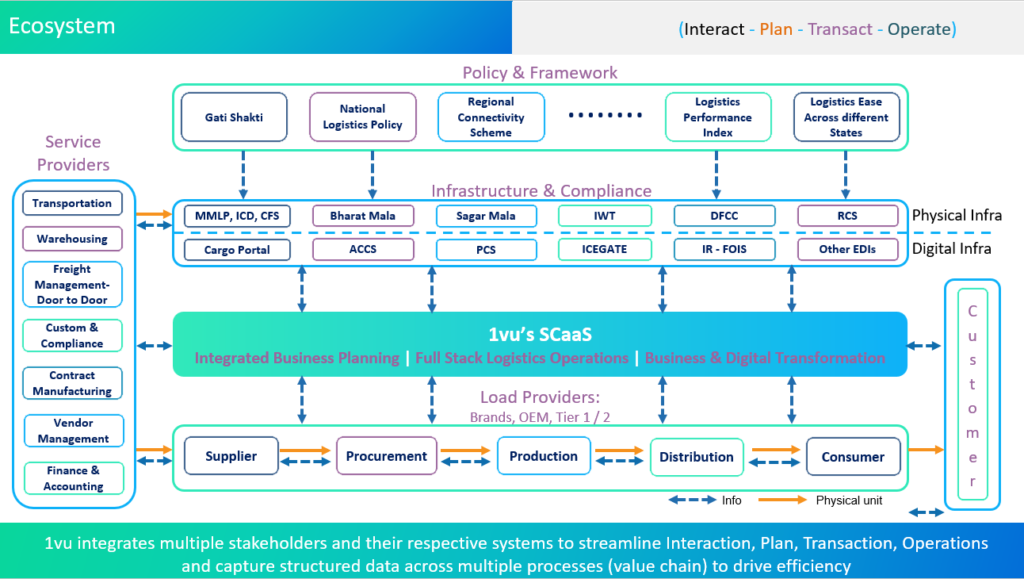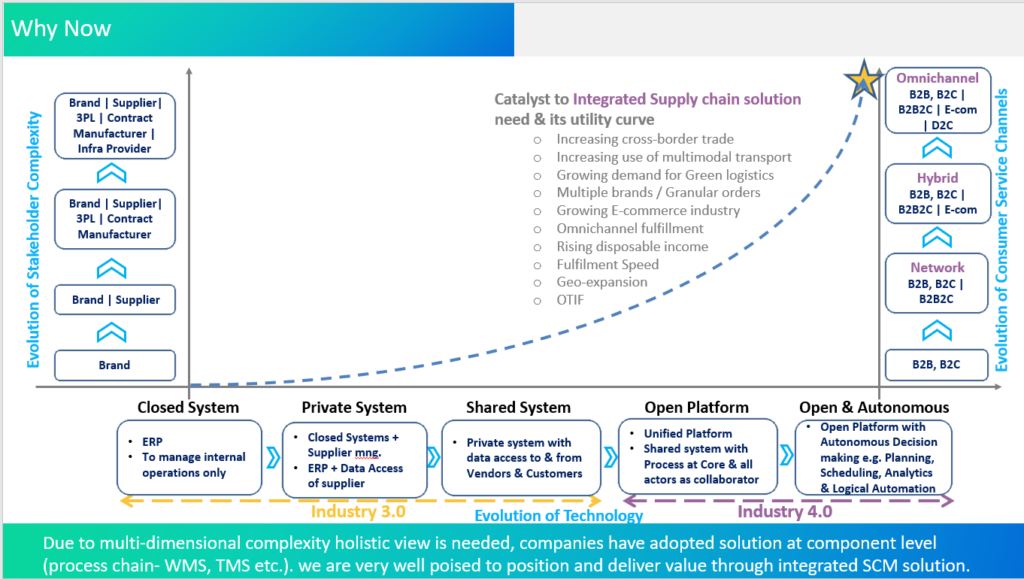Supply Chain as a Service
What is supply chain as a service?
Supply Chain as a Service (SCaaS) refers to a business model in which companies outsource certain or all aspects of their supply chain management to specialized service providers. These providers offer a range of services, such as warehousing, transportation, inventory management, order fulfillment, and logistics. The core idea behind SCaaS is to allow companies to focus on their core competencies while relying on experts to manage their supply chain operations efficiently and effectively. This approach can lead to cost savings, increased flexibility, and access to advanced technologies, ultimately improving overall supply chain performance and contributing to a company’s success.
What are the components of the supply chain as a service?
The components of Supply Chain as a Service typically include:
- Integrated Business Planning: comprehensive solutions for demand forecasting and planning, supply planning, ecosystem impact planning, and risk resilience.
- Logistics Operations: This service covers infra setup, sourcing, packaging, transportation, storage and handling, network inventory management, and freight management.
- Business & Digital Transformation: With a focus on innovation, process engineering, technology integration, collaboration tools, performance analytics & reporting, and customer support, SCaaS provides the tools to drive your business forward.

Who Needs Scaas?
Supply Chain as a Service (SCaaS) is a solution that can be beneficial for a wide range of businesses across various industries. Here are some key examples of who could benefit from SCaaS:
- By size
- Startups and Small Businesses: Smaller businesses often lack the resources and expertise to establish and manage complex supply chain operations. SCaaS allows them to access advanced supply chain management capabilities without the need for significant upfront investments.
- Medium-Sized Enterprises: Medium-sized businesses can leverage SCaaS to scale their supply chain operations quickly in response to growth or changing market demands. It provides the flexibility to expand without committing to large capital expenditures.
- Large Corporations: Even large corporations can find value in SCaaS by optimizing specific aspects of their supply chain, improving efficiency, and reallocating resources to core business functions.
- By nature of business
- E-commerce Retailers: E-commerce companies dealing with dynamic order volumes and seasonal fluctuations can benefit from SCaaS’s flexibility and order fulfillment expertise. It ensures a seamless customer experience during peak demand periods.
- Manufacturers: Manufacturers can outsource their logistics and transportation management to SCaaS providers, allowing them to focus on production and R&D while ensuring their products reach customers efficiently.
- Global Businesses: Businesses with international operations can benefit from SCaaS’s expertise in customs and compliance management, reducing the complexities of cross-border trade and know-how of the law of the land.
- Companies Expanding to New Markets: When entering new markets, SCaaS can provide valuable local insights and infrastructure, aiding in overcoming logistical challenges and adapting to local market demands.
- Companies Facing Seasonal Demand: Businesses with seasonal demand fluctuations, such as holiday-related sales peaks, can leverage SCaaS to scale up during busy periods & scale down during slow times.
In essence, any business looking to enhance supply chain efficiency, reduce costs, improve customer satisfaction, and focus on core competencies can find value in adopting Supply Chain as a Service.
What are the major Challenges the Industry faces with in-house Supply chain management?
- Complex Supply Chain Network: Design, Build, Operate, and manage a network of infrastructure, vendors, suppliers & resources across geography, ensuring compliance with regulatory requirements. Usually, goods go through multiple touchpoints (20+ entities & handled by 50+ personnel) before they reach the end consumer.
- Disintegrated and disconnected value chain: Duplicate records & re-entry across multiple systems (in-house & vendors) lead to human error, different nomenclature, and value chain disconnect. Dissociated & siloed systems make industry run at “t-2” or “t-1” days older data at best.
- Capacity constraints: Minimum operational capacity enforces minimum resources, costs, and overheads, while maximum capacity restricts scalability, impacting the flexibility and agility of the business.
- Cost: Building and managing a robust supply chain network demands significant investments in technology, infrastructure, skilled personnel, and ongoing operational costs. Uncertainty & inefficiencies exacerbate the situation
- Risk resilience: Traditional supply chain models may struggle to adapt quickly to dynamic market conditions and disruptions, such as natural disasters, geopolitical events, variability in demand, or supplier issues, leading to inefficiencies, delays, and increased operational costs.
- Technological Advancements: The supply chain landscape is continuously evolving with the introduction of new technologies such as Process Automation (IPA, RPA), Internet of Things (IoT), & artificial intelligence (AI). Still, businesses struggle with real-time visibility & transparency leading to the inability to mitigate risks proactively and run efficient operations.
- Deviation from Core Competencies: For most businesses, the supply chain serves as a crucial support function on which the core of their business relies. Managing it demands process control, focus and energy beyond their primary competencies
Why scaas?
Supply Chain as a Service (SCaaS) offers numerous compelling reasons for businesses to adopt this innovative & holistic approach to supply chain management.
- Cost Efficiency and Pay per use Expenses:
- Reduced Capital Expenditure: Businesses can avoid hefty investments in warehousing, transportation, and technology infrastructure. Instead, they pay for services as needed, reducing the need for significant upfront capital.
- Pay per use Operational Expenditure: Instead of capex and enforced opex, businesses pay for SCaaS on usage as an operational expense, optimizing resource allocation.
- Expertise Without Overhead: SCaaS providers bring specialized knowledge without the need for businesses to invest in hiring and training supply chain personnel.
- Capital for Innovation: The saved capital can be redirected towards innovation, research, and development, strengthening a company’s competitive edge.
- Scalability and Flexibility: SCaaS offers businesses the opportunity to streamline operations, reduce costs, enhance customer satisfaction, and focus on what they do best. It’s a transformative solution that empowers companies to stay agile, competitive, and responsive in an ever-evolving business landscape.
- Dynamic Demand: SCaaS is designed to scale according to business needs. Whether dealing with seasonal peaks or sudden growth, SCaaS providers can quickly adjust resources, ensuring operational efficiency without overcommitting resources.
- Quick Expansion and Contraction: Businesses can quickly scale up or down based on market conditions without the need for permanent resource expansion or contraction and without the long lead time associated with internal expansions.
- Time-to-Market Advantage: SCaaS streamlines processes, reducing the time it takes for products to move from production to the hands of customers. This competitive advantage can make a significant difference in fast-paced industries.
- Pilot Product or New Market: SCaaS expedites the launch of new products or existing product in new market, without building capacity & inherent cost, giving businesses a competitive advantage
- Global Supply Chain Management: Businesses operating on a global scale face the challenge of managing supply chains that span multiple countries and regions. SCaaS providers have the expertise, local insights, infrastructure, and network to navigate international regulations, customs, compliance, and logistics, streamlining cross-border operations.
- Risk Mitigation and Business Continuity: SCaaS providers bolster supply chain resilience by effectively managing risks and ensuring seamless business continuity, even amidst unforeseen events.
- Supply Chain Resilience: SCaaS providers deploy risk management strategies and contingency plans, countering disruptions due to natural disasters, geopolitical concerns, or supply chain interruptions.
- Minimized Downtime: SCaaS experts swiftly activate backup plans in the face of disruptions, curbing downtime and maintaining an uninterrupted supply chain.
Moreover, the persistently changing demands, unexpected disruptions, and global market intricacies pose continuous challenges for supply chain optimization. Traditional static models can struggle to promptly adapt to dynamic market conditions, resulting in inefficiencies, delays, and escalated operational expenses.
- Network effect: SCaaS offers network of infrastructure, vendors, suppliers & resources across geography providing Companies more room to get best deals cross network
- Supplier Collaboration: Maintaining effective communication and collaboration with suppliers is crucial for a smooth supply chain. SCaaS providers act as intermediaries, fostering strong relationships between businesses and their suppliers, ensuring timely deliveries and consistent quality.
- Shared Goals & Set KPIs, SLAs: SCaaS providers are aligned with businesses’ success, as their efficiency and performance directly impact the contractual SLAs hence partnership’s success.
- External Insights: Partnering with SCaaS providers brings external perspectives, innovative ideas, and best practices to the table, enriching the overall business strategy.
- Enhanced Customer Experience: SCaaS optimizes order fulfillment, reduces lead times, & provides real-time tracking for customers. This results in improved customer satisfaction and loyalty.
- Focus on Core Competencies: By outsourcing supply chain management, companies can focus their energy and resources on core competencies and strategic initiatives., such as product innovation, marketing, and customer engagement. This allows for greater efficiency in overall business operations and enables companies to concentrate on their unique value proposition.
- Technology Integration and Innovation: SCaaS providers leverage cutting-edge technologies like IoT, AI, and data analytics to optimize supply chain processes. This ensures real-time visibility, accurate forecasting, and data-driven decision-making.
- Access to Integrated Business Planning tools for dynamic decision-making encompassing demand forecasting and planning, supply planning, ecosystem impact planning, and risk resilience
- Integrated EDI’s ensure clean & real time data leading to Real-time Visibility and Analytics: Effective supply chain management requires real-time visibility into inventory levels, transportation status, and overall performance. SCaaS providers integrates EDI’s from all stakeholders (vendors, supplier, customers, in-house) and utilize advanced analytics and data-driven insights to optimize supply chain operations, improving efficiency and reducing costs.
- Stay Current with Trends: Outsourcing ensures that businesses stay updated with the latest supply chain technologies and practices, without the burden of constant research and adoption.
- Continuous Improvement and Optimization: SCaaS providers work collaboratively with businesses to identify areas for optimization and process improvement, ensuring that the supply chain evolves with changing demands.
- Regular Process Evaluation & Engineering : SCaaS providers continuously evaluate supply chain processes, identifying areas for optimization and implementing improvements.
- Adapting to Change: Outsourcing ensures that the supply chain is agile and adaptable, ready to respond to evolving market conditions and customer demands.
In conclusion, Supply Chain as a Service (SCaaS) addresses several critical challenges faced by businesses in today’s dynamic and competitive market. From handling complexities and uncertainties to leveraging external expertise, technology, and scalability, SCaaS offers a strategic solution for businesses to optimize their supply chain operations and achieve greater success in the ever-evolving business landscape.

Authored By Mr Keshav Kumar
Founder, 1vu.org



